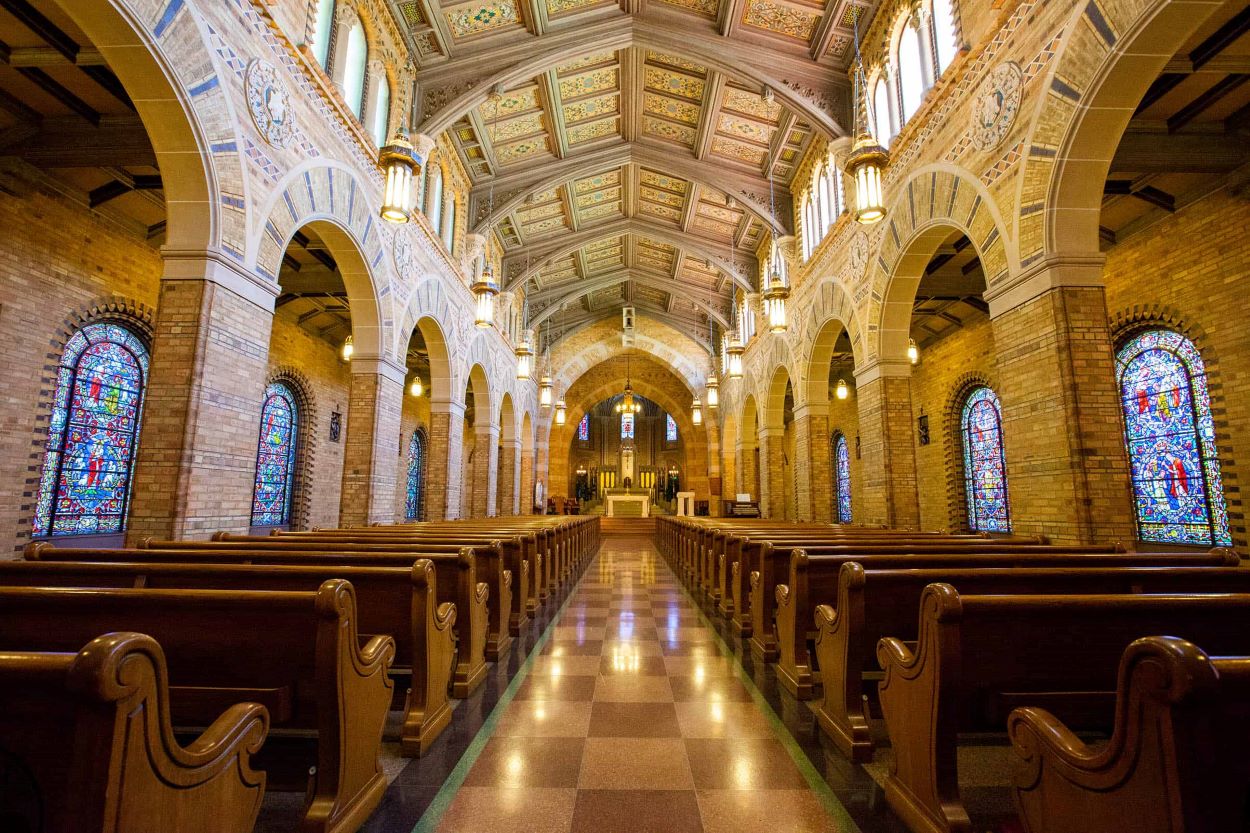Home>Theology and Spirituality>What Is Another Name For Baptism


Theology and Spirituality
What Is Another Name For Baptism
Published: March 1, 2024
Ericka Andersen, an editor at Christian.net, expertly merges digital strategy with content creation, focusing on faith and societal issues. Her communication skills enhance the platform's engaging narratives, fostering meaningful dialogue on belief's impact on society.
Discover the significance of baptism in theology and spirituality. Explore the alternative term for baptism and its spiritual implications. Unlock the deeper meaning of this sacred ritual.
(Many of the links in this article redirect to a specific reviewed product. Your purchase of these products through affiliate links helps to generate commission for Christian.net, at no extra cost. Learn more)
Table of Contents
The Significance of Baptism
Baptism holds immense significance in the Christian faith, serving as a pivotal moment in an individual's spiritual journey. It symbolizes the cleansing of sin and the initiation into the body of Christ. Here are some key points that highlight the significance of baptism:
-
Spiritual Rebirth: Baptism is often referred to as the "new birth" or "regeneration" in Christian theology. It signifies the spiritual rebirth of an individual, marking the beginning of their life as a follower of Christ.
-
Forgiveness of Sins: Through baptism, Christians believe that their sins are forgiven, and they are cleansed of their past transgressions. This act of purification is seen as a crucial step towards leading a life in accordance with the teachings of Jesus Christ.
-
Union with Christ: Baptism symbolizes the believer's union with Christ in his death, burial, and resurrection. It is a public declaration of one's faith in Jesus and a commitment to follow his teachings.
-
Incorporation into the Church: Baptism is also significant as it marks the incorporation of an individual into the community of believers. It signifies their acceptance into the larger body of Christ and their commitment to participate in the life of the church.
-
Gift of the Holy Spirit: In many Christian traditions, baptism is associated with the reception of the Holy Spirit. It is believed to be a moment when the Spirit of God comes upon the individual, empowering and guiding them in their Christian walk.
-
Symbol of Hope and New Life: The act of being immersed in water during baptism symbolizes the washing away of the old self and the emergence of a new creation in Christ. It represents hope, renewal, and the promise of eternal life.
-
Obedience to Christ's Command: For many Christians, baptism is significant because it is a direct commandment from Jesus. In the Great Commission, Jesus instructed his followers to baptize believers in the name of the Father, the Son, and the Holy Spirit, making it an essential practice in the Christian faith.
Baptism is a deeply meaningful and significant rite in Christianity, carrying with it a rich tapestry of spiritual symbolism and theological significance. It marks the beginning of a lifelong journey of faith and discipleship, signifying the believer's commitment to Christ and their participation in the community of believers.
Read more: What Is The Baptismal Name?
The Meaning of Christian Initiation
Christian initiation encompasses the process through which individuals are welcomed into the community of believers and formally enter into the life of the Church. It is a multifaceted journey that involves various rites and rituals, with baptism playing a central role. The meaning of Christian initiation can be understood through the following aspects:
-
Welcoming New Believers: Christian initiation is a profound expression of the Church's welcome to new believers. It signifies the embrace of individuals into the family of faith, acknowledging their decision to follow Christ and become part of the Christian community.
-
Incorporation into the Body of Christ: Through initiation, individuals are incorporated into the mystical body of Christ, which is the Church. This incorporation signifies their participation in the life, mission, and worship of the Church, as well as their connection to the global community of Christians.
-
Reception of Sacraments: Christian initiation often involves the reception of multiple sacraments, including baptism, confirmation, and the Eucharist. These sacraments mark the individual's entry into the fullness of the Christian life and their reception of the grace and blessings associated with each sacrament.
-
Formation and Instruction: Initiation also encompasses a period of formation and instruction, where new believers are educated about the teachings of the faith, the significance of the sacraments, and the responsibilities of being a member of the Church. This period of catechesis prepares individuals for their active participation in the life of the Christian community.
-
Transformation and Renewal: Christian initiation represents a journey of transformation and renewal. It symbolizes the spiritual rebirth and the inner renewal experienced by individuals as they commit themselves to a life of faith. Through initiation, believers are invited to embrace a new way of living and thinking, guided by the principles of the Gospel.
-
Continuation of Tradition: Initiation also serves as a continuation of the rich Christian tradition, linking new believers to the historical and theological heritage of the Church. It connects them to the practices, beliefs, and rituals that have been passed down through generations, fostering a sense of continuity and unity within the faith community.
Christian initiation holds profound significance in the life of the Church and in the spiritual journey of individuals. It represents a pivotal moment of welcome, incorporation, and transformation, marking the beginning of a lifelong commitment to the Christian faith and the community of believers.
The Symbolism of Water in the Christian Tradition
Water holds profound symbolic significance within the Christian tradition, representing various spiritual concepts and realities that are central to the faith. The symbolism of water in Christianity is rich and multifaceted, carrying layers of meaning that resonate deeply with the beliefs and practices of the Church. Here are some key aspects of the symbolism of water in the Christian tradition:
-
Cleansing and Purification: Water is often associated with cleansing and purification in the Christian faith. Baptism, which involves the use of water, symbolizes the washing away of sin and the spiritual purification of the individual. It represents a new beginning and the removal of spiritual impurities, signifying the believer's readiness to embark on a life of faith and discipleship.
-
Life and Rebirth: Water is a symbol of life and rebirth in Christianity. Just as water is essential for physical life, it is also linked to spiritual life and renewal. Through baptism, individuals are symbolically born anew, entering into a life of faith and experiencing spiritual rebirth. The act of immersion in water and emerging from it mirrors the idea of dying to the old self and rising to new life in Christ.
-
Spiritual Nourishment: Water is often associated with nourishment and sustenance. In the Christian tradition, it symbolizes the spiritual nourishment that believers receive through their faith. Just as physical water is essential for sustaining life, the spiritual water of faith sustains and nourishes the soul, providing strength and sustenance for the journey of faith.
-
Cleansing of the Word: The concept of the "washing of water with the word" is mentioned in the New Testament (Ephesians 5:26). This signifies the purifying and transformative power of the Word of God, which is often symbolized by water. The Word of God is likened to water in its ability to cleanse, renew, and bring about spiritual transformation in the lives of believers.
-
Baptism and Salvation: Water is intricately linked to the Christian understanding of salvation. Baptism, which involves the use of water, is seen as a means of grace through which individuals are united with Christ and receive the gift of salvation. The symbolism of water in baptism underscores the believer's participation in the death and resurrection of Jesus Christ, signifying their incorporation into the redemptive work of Christ.
-
Purification and Renewal: Water symbolizes the process of purification and renewal in the Christian tradition. It represents the cleansing of the soul and the renewal of the inner being, reflecting the transformative power of God's grace. The act of immersion in water during baptism signifies the believer's willingness to be purified and renewed by the work of the Holy Spirit.
The symbolism of water in the Christian tradition is deeply ingrained in the theological and spiritual fabric of the faith. It serves as a powerful and evocative symbol of cleansing, rebirth, nourishment, and salvation, encapsulating the core tenets of the Christian message and the transformative power of God's grace.
The Rite of Passage in Christianity
The rite of passage in Christianity holds profound significance as it marks the transition of an individual from one stage of life to another within the context of their faith journey. This rite is deeply rooted in the traditions and beliefs of the Christian faith, serving as a pivotal moment in the spiritual and communal life of believers. Here are key aspects that illuminate the significance of the rite of passage in Christianity:
-
Transition to Adulthood: In many Christian traditions, the rite of passage is associated with the transition of young believers from adolescence to adulthood. This transition is often marked by specific rituals or sacraments, such as confirmation, which symbolize the individual's readiness to take on a more active role in the life of the Church and embrace their faith as independent, mature members of the Christian community.
-
Commitment to Faith: The rite of passage signifies an individual's commitment to their faith and the Christian way of life. It represents a conscious decision to embrace the teachings of Jesus Christ and actively participate in the life and mission of the Church. Through this rite, believers publicly declare their dedication to living out their faith and contributing to the spiritual growth of the community.
-
Reception of Sacraments: The rite of passage often involves the reception of specific sacraments, such as confirmation or the Eucharist, which are integral to the individual's full initiation into the sacramental life of the Church. These sacraments mark the individual's entry into a deeper relationship with God and the community of believers, signifying their readiness to partake in the spiritual blessings and responsibilities associated with each sacrament.
-
Affirmation of Beliefs: The rite of passage provides an opportunity for individuals to publicly affirm their beliefs and embrace the core doctrines of the Christian faith. Through rituals such as confirmation, believers reaffirm their baptismal vows and express their commitment to upholding the beliefs and values of the Christian tradition, solidifying their identity as followers of Christ.
-
Empowerment and Commissioning: The rite of passage often involves a sense of empowerment and commissioning, as individuals are encouraged to use their gifts and talents for the service of God and the community. This empowerment signifies the individual's readiness to take on active roles within the Church, contributing to its mission and ministry as they mature in their faith.
-
Integration into the Community: The rite of passage serves as a means of integrating individuals into the wider Christian community, fostering a sense of belonging and responsibility within the body of believers. It signifies their acceptance as full members of the Church, encouraging them to actively participate in its worship, fellowship, and outreach activities.
The rite of passage in Christianity is a significant and transformative experience that marks the spiritual growth and maturation of believers within the context of their faith. It represents a pivotal moment of commitment, affirmation, and integration, shaping the individual's identity as a member of the Christian community and empowering them to live out their faith in a meaningful and purposeful manner.















